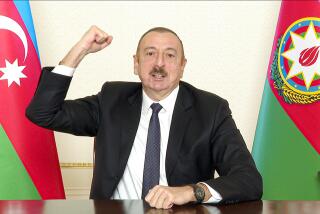In Shift, U.S. Urges Restraint by Gorbachev
- Share via
WASHINGTON — The Bush Administration, alarmed by reports of massive bloodshed in Azerbaijan, urged Soviet leader Mikhail S. Gorbachev on Saturday to exercise restraint in his crackdown against the rebellion.
“It is . . . the responsibility of any government to maintain order and protect its citizens,” White House spokesman Sean Walsh said, reading an official statement. “The effort to establish order should not, however, become a cloak for the abridgement of the exercise of political rights.
“We regret the already heavy loss of life,” he continued, “and call upon all involved to act with restraint in the use of force and to show respect for the rule of law and the rights of the individuals involved.”
The statement marked a shift in tone for the Administration, which had been rooting almost openly for the Soviet army to crush the rebellion.
Officials said they still want Gorbachev to succeed in quelling the violence in Azerbaijan, but they do not want to appear to be giving U.S. approval for excessive force or a retreat from political reforms.
“We have tried to express our understanding of Gorbachev’s position, and we agree that there is a need to restore order, but we’ve never said we’ve given the Soviets a carte blanche,” one official said.
“If they go beyond what is necessary to restore order to a Chinese-style mopping up, we’d have to revise our position,” he said, referring to the massacre of pro-democracy demonstrators in Beijing last June 3-4.
Gorbachev sent Red Army tanks blasting through street barricades in Azerbaijan’s capital of Baku early Saturday, touching off a full day of fighting between troops and well-armed Azerbaijani insurgents.
“It appears that order is slowly being restored,” a well-informed U.S. official said. “But we are relying largely on Soviet reports for much of what we know.”
He noted that U.S. reconnaissance satellites have monitored continuing movements of Soviet army reinforcements to the area.
He said U.S. officials could not confirm the reported casualty figures from Baku, which ranged from the Soviet government’s figure of 51 dead to an estimate by the principal insurgent group, the Azerbaijani Popular Front, of more than 200 dead. “But there’s clearly a lot of bloodshed,” he said.
Gorbachev intervened in Azerbaijan after a week of attacks by ethnic Azerbaijanis, who are largely Muslims, against ethnic Armenians, who are largely Christians and make up much of the merchant class in Baku, a Caspian Sea port.
In a speech broadcast across the Soviet Union on Saturday--and monitored by U.S. officials in Washington via satellite--Gorbachev said he had acted to prevent further violence and to stop the Popular Front from taking over Azerbaijan.
The State Department praised the speech. “We, too, hope that the people of the region will show wisdom and restraint,” spokesman David Denny said, reading an official statement. “And we hope that the restoration of order in the region will be followed quickly by the beginning of a dialogue on resolving differences peacefully between the parties.”
The White House said President Bush, who was spending the weekend at Camp David, “is being kept abreast of the situation.”
Officials said they knew of no direct communication between Gorbachev and Bush on the issue. But Soviet officials informally have thanked U.S. diplomats for the Administration’s backing, one aide said.
Officials said the Administration is trying to walk a fine line on the crisis, supporting Gorbachev’s effort to restore order--and maintain his own, embattled position of leadership--without endorsing excessive force.
The Administration’s unusual position in support of a Soviet crackdown reflects not only concern over Azerbaijani attacks against ethnic Armenians but also U.S. analysts’ conviction that Gorbachev had to crack down or risk losing his authority as Soviet leader.
“Having failed to restore order with more limited use of force, Gorbachev clearly had to escalate to show who was boss,” one official said.
More to Read
Sign up for Essential California
The most important California stories and recommendations in your inbox every morning.
You may occasionally receive promotional content from the Los Angeles Times.











